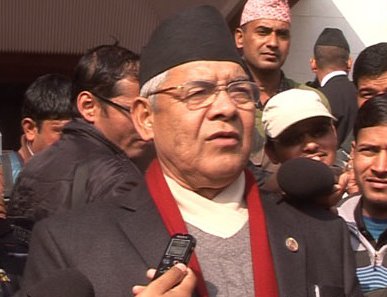
When he was elected the prime minister by Legislature Parliament on February 10, 2014 by 405 members, with 148 in the opposition, Sushil Koirala, had compromised the portfolio of Home to CPN-UML's' tainted figure' Bam Dev Gautam. Gautam was now the happiest man.
But his happiness faced uncertainty in less than 12 hours when CPN-UML issued notice to their CA members not to take part in the oath ceremony by excluding party chairman Jhalnath Khanal and party leader Madhav Kumar Nepal. CPN-UML's politburo sanctioned two former prime ministers Khanal and Nepal to be present at the oath taking ceremony at the last minute.
Promising to hold the elections for local bodies within six months, promulgating the new constitution by a year, restoring law and order, showing zero tolerance against corruption, making administrative service effective and bringing a long term vision to make Nepal economically prosperous and sound, Koirala used all kinds of sweet words in his statement.
Given the nature of his alliance and the party's position, the prime minister's statement sounds hollow when all CA members of his alliance, CPN-UML ,decided to boycott the oath taking ceremony because of his reluctance to hand over home portfolio and deputy prime minister to CPN-UML leader Bam Dev Gautam.
Although he has made so many promises, he is likely to bow down in front of CPN-UML leadership to continue his government. Prime Minister Koirala, who always criticized his party colleagues as corrupt, putting party affairs aside, is now at the helm of the party and government as well. Koirala, whose party cannot run the government on its own, will have to compromise everything to continue in power.
"He always blamed us and criticized us as corrupt when we were in power. Now, he is leading the government with CPN-UML leader, who was declared as one of the most corrupt leaders by his own colleagues a few years ago," said a Congress leader on condition of anonymity.
Possible scenario
Although Sushil Koirala leads the coalition government with a thumping majority, it is unlikely to provide much needed political stability to carry out economic development programs. Given the current political equation and strength of the party, he won't be able to take any major new step having long term implications.
As the new government needs all out support from CPN-UML to make major decisions, Koirala has to compromise many things with CPN-UML in all major issues before taking the decision. In this sense, this government will be handicapped.
So far as holding the elections for local bodies and drafting the new constitution is concerned, it will depend on Koirala's skills to negotiate with the opposition political parties, including UCP-Maoist, RPP-Nepal and Madheshi parties. As UCPN-Maoist and Madheshi parties will oppose Koirala's move to hold the elections for local bodies without agreement on federalism, this issue will also test Koirala's skills.
"We will not allow holding the election of local bodies without making agreements on the federal structure, "said Rajendra Mahato, leader of a Madheshi party."We are not against elections of local bodies, but we don't want to have local body elections at the cost of federalism."
Looking at Nepal's five decades of political course, one can easily draw the conclusion that Nepal's fate depends on its geostrategic move rather than our own announcement. Lessons from Nepal's political history is that Nepalese have to go a long way to see a stable political scenario and economic prosperity. One can understand the reason behind Koirala's ambitious plan, but it will take a long time before he can take any decision.

Keshab Poudel
Poudel is the editor of New Spotlight Magazine.
- KUL MAN GHISING: Bowing Down To The People
- Apr 13, 2025
- POLITICAL VIOLENCE: Culture of Impunity
- Apr 11, 2025
- PM OLI MEETS PM MODI: No Progress
- Apr 09, 2025
- PM OLI’S THAILAND VISIT: Flip Flop
- Apr 08, 2025
- FM Dr. Deuba’s India Visit: Mission Aborted
- Mar 26, 2025















